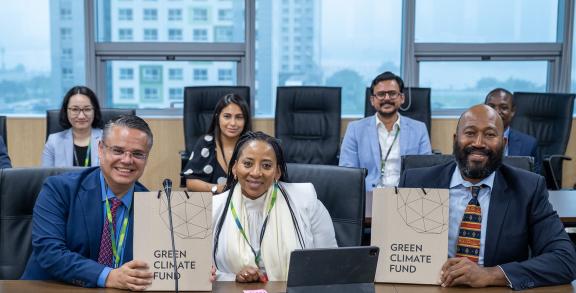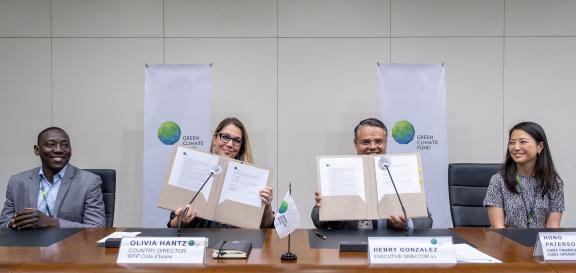Six project agreements for climate action were signed by the Green Climate Fund (GCF) and its partners on the margins of GCF’s 36th Board meeting (10-13 July 2023), a record number for the Fund.
Out of 12 projects formally approved at GCF’s 36th Board meeting, six project agreements, or Funding Activity Agreements (FAAs), have been signed just days later, demonstrating the Fund’s increasing speed in moving projects from approval to implementation on the ground.
The projects will increase climate resilience in five developing countries: South Africa, Côte d’Ivoire, three states in Micronesia, Solomon Islands, and Bangladesh. Four of the projects were approved through the Simplified Approval Process (SAP), a GCF funding modality for projects up to USD 25 million that require simpler and fewer documents for project applications.

FP209: Climate Change Resilience through South Africa’s Water Reuse Programme (“WRP”) with Development Bank of Southern Africa (DBSA)
South Africa is ranked as one of the most vulnerable countries to climate change, particularly in relation to water-scarcity. This USD 1.5 billion project, with USD 235 million in GCF financing, aims to establish and operationalise a national water reuse programme which will address water scarcity by transforming the country’s wastewater system.
At the signing of the agreement, Henry Gonzalez, GCF’s Executive Director a.i., said, “GCF uses its resources to de-risk and create new markets. This partnership between DBSA and GCF is not just about capital. It’s about sharing knowledge, policies, and resources while highlighting the nexus between climate and developmental goals.”
Catherine Koffman, Group Executive Project Preparation at DBSA, added, “Climate finance is becoming one of the most successful tools for socio-economic development. Development must inculcate climate finance principals for us to meet our net-zero targets. This is the justice of the just-transition pathway that we follow as a development bank. Thank you to the GCF for partnering with us and delivering on our mandate.”
Dr. Sean Phillips, Director General - Department of Water and Sanitation, Government of South Africa, thanked GCF and DBSA for the “tremendous level of effort and time dedicated to completing this funding proposal.”

SAP028: Women-Adapt: Enhancing the climate change adaptive capacity of smallholder farmer communities in the Poro Region, focusing on vulnerable women and youth with World Food Programme (WFP)
In the Poro region of Côte d’Ivoire, 90 per cent of households make a living from agriculture. Rising temperatures, longer dry-spells, irregular precipitation patterns, and harvest losses threaten to offset the local economy, endangering the livelihoods of these households, many of them female-headed. This USD 10 million project, with USD 9 million in GCF financing, will adopt a gender-transformative approach to enhance climate resilience and address the technical, institutional, and financial barriers of smallholder farmer communities in the region.
Speaking at the signing of the agreement, Henry Gonzalez said, “Gender is at the core of our new strategic plan, and with this project we can strengthen the adaptive capacities and enhance the resilience of women-led smallholder farmer communities in Côte d’Ivoire. We thank WFP for your innovation, partnership, and support in achieving more climate action.”
Olivia Hantz, Country Director at WFP Côte d’Ivoire, added “Climate change affects us all, but its impact is felt most acutely by vulnerable people, especially women and young people. Through collaboration with the government, NGOs, and local communities, this project will foster knowledge sharing and will leverage resources to maximise impact and ensure access to livelihood opportunities and sustainable food systems. We are proud to be working together.”
This project is designed to synergise with the Inclusive Green Financing Initiative I project.

SAP029: Ecosystem-based Adaptation (EbA) for Reducing Community Vulnerability to Climate Change in Northern Pacific Small Island Developing States (SIDS) with Micronesia Conservation Trust (MCT)
Coastal and marine environments play a key role for the communities that live in the Micronesian archipelago. However, climate impacts are threatening the rich biodiversity and ecosystems that are essential for food security. By establishing small-grant facilities in the Federated States of Micronesia, the Marshall Islands, and Palau, this USD 9.9 million project, with USD 8.9m in GCF financing, intends to scale up locally led ecosystem-based adaptation (EbA) initiatives, while encouraging the active participation of women beneficiaries.
Speaking at the signing of the agreement, Henry Gonzalez said “We are very pleased to work with three Micronesian developing states. Micronesia, Marshall Islands, and Palau are among the most vulnerable to the effects of climate change. This proposal makes good use of GCF’s enhanced direct access modality to empower communities so they can act as a steward of ecologically invaluable coastal and marine ecosystems.”
His Excellency Tregor Albon, Ambassador, Embassy of The Republic of Marshall Islands, Seoul, said that “Direct Access Entities (DAEs) are quick, inclusive, mindful of cultural contexts, and allow us direct intervention to an overwhelming global process such as GCF. As a nation of traditional knowledge owners, our people have an opportunity to direct what our priorities are.”
William Kostka, Executive Director at MCT, added, “Nature-based solutions present an opportunity to directly support indigenous peoples and local communities who are intimately connected with ecosystems, relying on them for livelihoods, cultural identity, and wellbeing. By engaging indigenous peoples and local communities in planning, implementation, and management, we foster social equity, enhanced local capacity, and improve the overall resilience of SIDS.”

SAP027: Solomon Islands Knowledge-Action-Sustainability for Resilient Villages (SOLKAS) Project with Save the Children Australia
Sea level and temperature rise, extreme rainfall, flooding, and droughts threaten the Solomon Islands’ population. Local communities – particularly in remote and rural areas – are reliant on dwindling natural resources, leading to reduced labour productivity, water and food scarcity, and degradation of ecosystems. This USD 31.8 million project, with USD 25 million in GCF financing, will strengthen the climate resilience of targeted communities via a locally led approach to adaptation which will roll out an innovative, digitised approach to adaptation planning, increase the physical resilience of schools, integrate climate change into curriculum materials, and help communities safeguard their food and water security and livelihoods.
Speaking at the signing of the agreement Henry Gonzalez said, “This project is critical as it engages school and youth stakeholders to understand the impacts of climate change. By using data driven adaptation decisions, the project supports important policies at the national level while also mainstreaming climate change in school curriculum. By engaging local communities, this project is protecting future generations.”
Mat Tinkler, Save the Children Australia CEO added, “Extreme weather events not only wipe out communities and homes, but they can also rob children of their education and future. This is a locally led project that will provide the resources for children and their families to develop and share knowledge and skills to better safeguard schools, educations, and futures. I thank the GCF for investing in locally led and community-based approached to adaptation, as highlighted in GCF’s updated strategic plan.”
Chanel Iroi, Deputy Secretary of the Ministry of Environment, Climate Change, Disaster Management and Meteorology expressed his gratitude to the GCF Secretariat and Save the Children Australia for supporting the Solomon Islands.

Palli Karma-Sahayak Foundation (PKSF) Bangladesh and GCF signed two projects:
The vulnerability of the coastal people in Bangladesh can be defined in three ways: climate-sensitive livelihoods; vulnerable settlements in low-lying areas; and scarcity of safe drinking water. Many coastal residents live in vulnerable housing structures and depend on seasonal agriculture and agriculture wage labour, which are highly climate sensitive. This USD 50 million project, with USD 42.2 million in GCF financing, will finance the development of climate-resilient housing and livelihood technologies while raising knowledge and awareness about the impacts of climate change.
SAP026: Extended Community Climate Change Project-Drought (ECCCP-Drought)
Bangladesh is experiencing increasing frequencies of drought in its flat and low-lying north-western region (NWR), an agricultural hub in the country. More than 60 per cent of the population in the region are small farmers and agricultural labourers who suffer from food deficiency caused by prolonged drought-periods. This USD 30 million project, with 25 million in GCF financing, will improve the capacities of water planning and governance, including infrastructure maintenance and clean water access points to reduce the burden of women who are tasked with collecting water.
Speaking about both projects, Henry Gonzalez said, “These two funding proposals are focused on the livelihoods of vulnerable people in Bangladesh. We have a huge opportunity to enhance the resilience of local communities, develop climate-resilient housing, address water-scarcity, and benefit women-headed households. I am inspired by the possibilities of these projects.”
Speaking about the RHL project, Dr. Nomita Halder ndc, Managing Director of PKSF said, “There are three ways to describe how the coastal residents of Bangladesh are vulnerable; poor human settlement in low lying areas; climate sensitive livelihoods; and scarcity of safe drinking water. This project is a social protection project that supports livelihoods and decreases the levels of climate migration in the region.”
Speaking about the ECCCP-Drought project, she added, “Women often walk miles to find water in the dry season, leaving little time for more productive activities. This 4-year project will implement and integrate water resources management using the ‘4-R approach’: reuse; recharge; recycle; and reduce, to increase the resilience of drought vulnerable communities at the institutional and grass-roots level to sustainably mange scarce water resources.